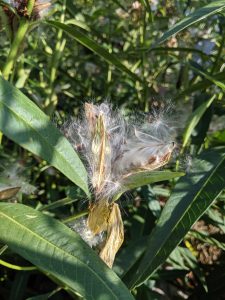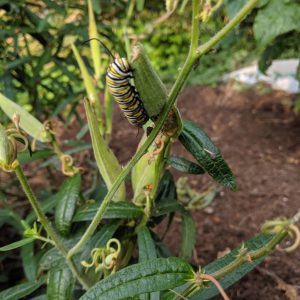Milkweed and Monarchs: Plant It and They Will Come
Let’s take a trip in the wayback machine. Like the way, way, way, way, wayback machine.
I can remember playing with milkweed pods growing through the fence of my elementary school’s playground. While I was unaware of the relationship between milkweed and monarchs, I remember there was milkweed everywhere and vividly remember playing with the pods as they burst in the fall.
Is that when my fascination with monarchs started? Perhaps.
Regardless, all these years later monarchs have a special place in my heart and my garden. As does milkweed. Because, as we all know, milkweed is the only host plant for monarchs.
Planting Butterfly Weed
Five or six years ago, I started planting milkweed in the garden. Like many people, I first planted butterfly weed (asclepias tuberosa) because it was easy to find at my favorite garden store.
Butterfly weed also spreads on its own, but not too quickly, and comes back reliably year after year.
Planting More Milkweed
Over time, I realized I could attract and help more monarchs if I planted different types of milkweed. Logical, right?
So, I added the following:
- Common milkweed (asclepias syriaca): perennial, added two years ago, can be invasive
- Swamp milkweed (asclepias incarnata): perennial, added two years ago, monarchs have loved it from the get go
- Whorled milkweed (asclepias verticillata): perennial, added this year
I’m fortunate that I have a large yard to play and plant in. Butterfly weed is growing in three different areas, swamp milkweed has taken over the wet area in the back of our yard, common milkweed is growing in a defined area (aka, easy to pull out milkweed that has travelled too far) in the backyard of our rental house, whorled milkweed is just getting started in my Monarch Waystation, and I sowed tropical milkweed seeds closer to the house (hubby and I have enjoyed sitting on the deck watching the butterflies, bees, and hummingbirds).
Spotting Caterpillars Everywhere
Each summer, I impatiently wait for the first sighting of a monarch in the garden. This year, my first sighting was in the form a caterpillar on the common milkweed in mid-June.
Good start but then I waited and waited and waited some more.
The monarchs began arriving in the garden around the second week of July.
Finally, in mid-August, I started seeing monarch caterpillars—without having to look too hard—on all the different types of milkweed.
So, yes, if you plant it they will come. Given the struggle that monarchs and all pollinators have these days, it’s the least I can do to help.








Mary R Gilbert
August 30, 2019 at 9:47 amIt’s always a helpful less from you Sarah…hope that you’ll soon have time to plan for next year!
xx,
M
Rita Verderber
August 30, 2019 at 11:26 amLove this post, Sarah. Thank you!